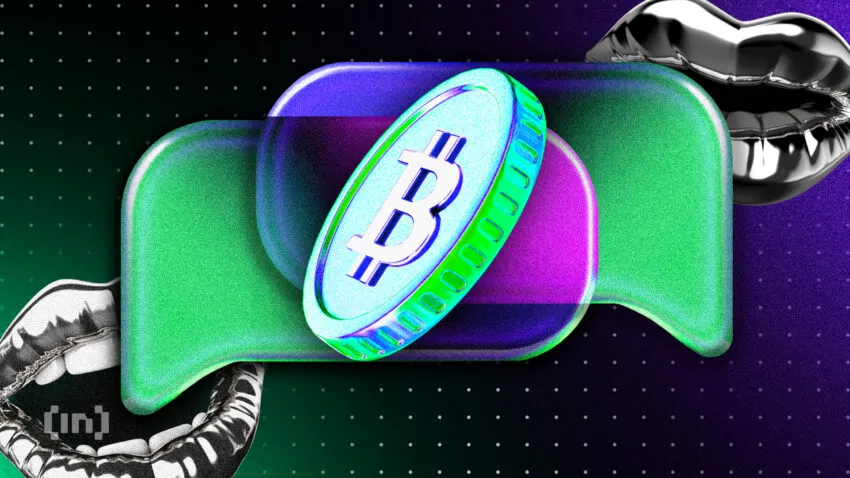Users looking to buy Bitcoin no longer have to go via a crypto exchange unless they choose to. Increasing numbers of payment services, including fintech apps like Cash App, now offer customers the opportunity to buy crypto directly via their platforms. Want to know how to go about this? This guide covers how to buy Bitcoin on the Cash App platform with step-by-step instructions.
KEY TAKEAWAYS
➤ Cash App has an easy process for buying Bitcoin, requiring just a few steps through its mobile app.
➤ The app supports Bitcoin transactions, leveraging the Lightning Network for efficiency, alongside other financial services like stock trading and peer-to-peer payments.
➤ Cash App charges transaction fees for Bitcoin purchases and ensures user security with encrypted storage and PCI-DSS Level 1 compliance.
➤ Users should consider Bitcoin’s price volatility and associated network fees when buying on Cash App, as these factors can significantly impact investments.
How to buy Bitcoin on Cash App
If you are unfamiliar with the crypto services offered by Cash App, don’t worry—we’ve got you covered. To buy BTC, simply do the following steps.
- Download Cash App.
- Create an account using an email or phone number.
- Create a $Cashtag.
- Begin purchasing Bitcoin.
1. Naturally, before you buy Bitcoin on Cash App, you must download the app itself. You can download it via a QR code on the Cash App website or through Google Play and the Apple App Store.
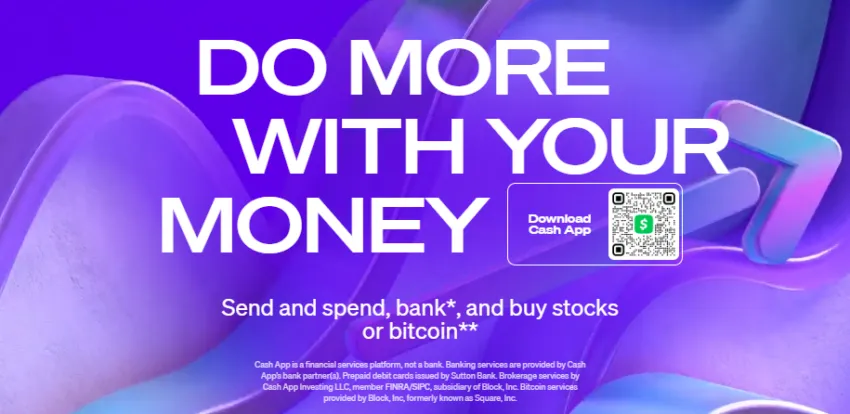
2. You must register for an account, which will require an email or phone number. This step will also have require you to provide some residential information, creating a unique “$Cashtag,” and to add a debit card.
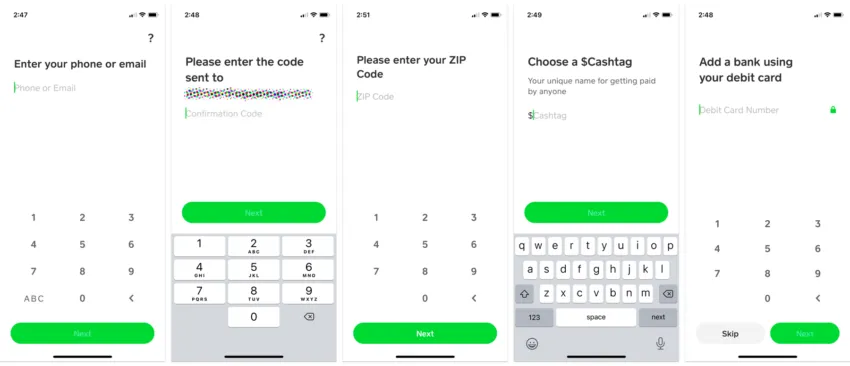
3. To purchase Bitcoin, open the app and tap the Bitcoin section on the main screen of your Cash App app.
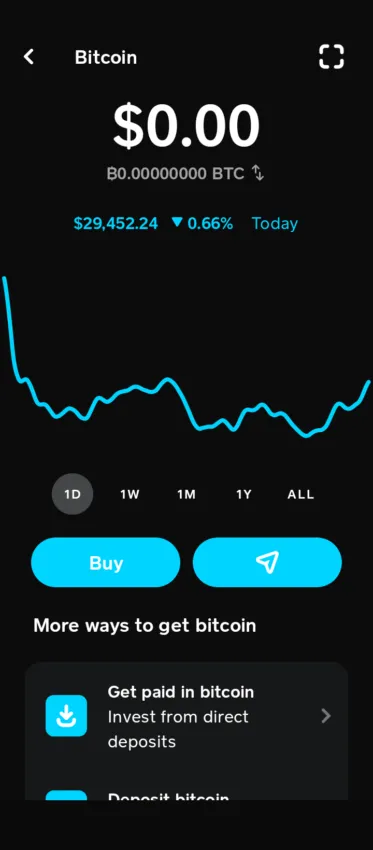
4. Click on Buy.
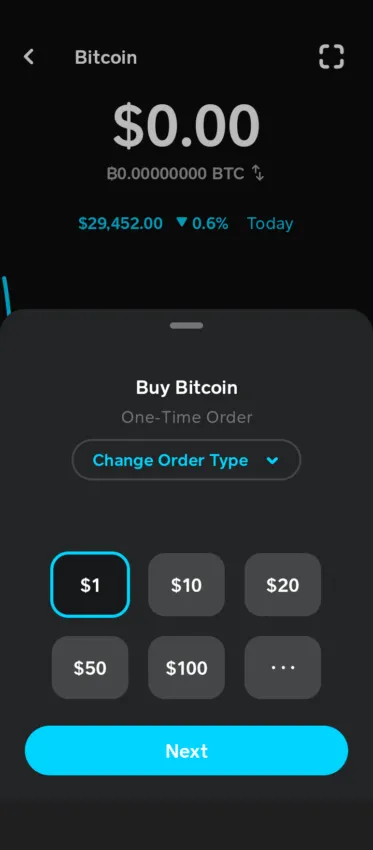
5. Choose an amount or tap “…” to input a custom amount. You can also change your order type if you need more specific accommodations.
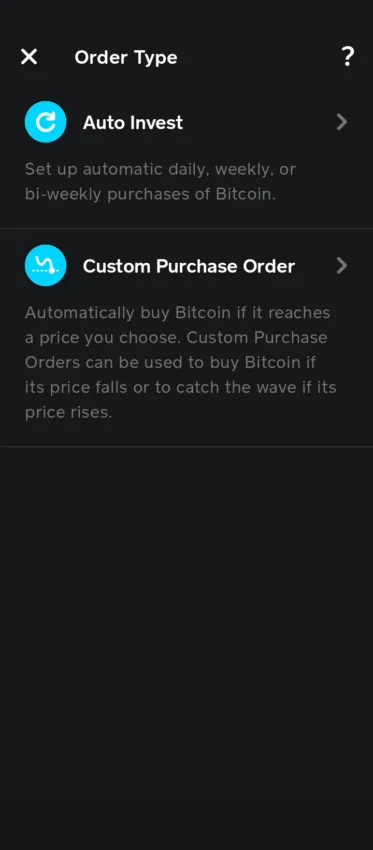
6. Enter your PIN and then confirm your choice.
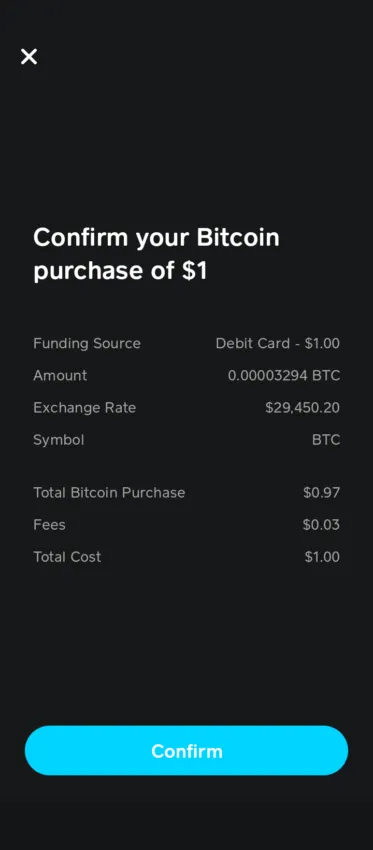
How to buy Bitcoin on Cash App and send it to another wallet?
To buy and send BTC on Cash App to another wallet, do the following:
- Open Cash App.
- Buy Bitcoin.
- Select a Bitcoin or Lightning address.
- Send Bitcoin.
1. Open Cash App: On the following page, you will see the Cash Balance and Save & Invest sections. In the Save & Invest section, select Bitcoin.
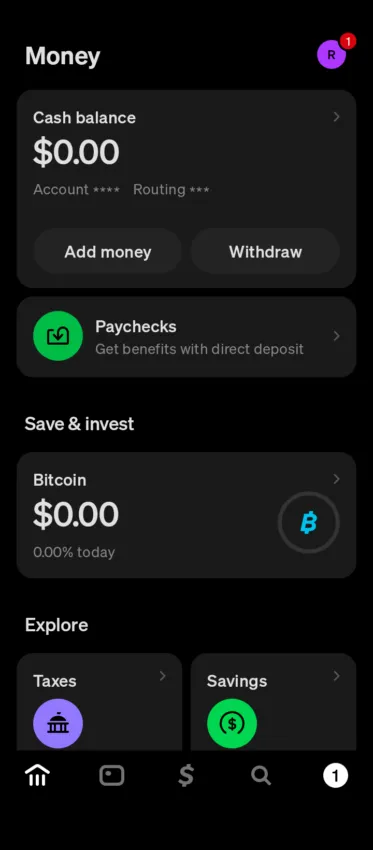
2. Buy BTC: Buy BTC on Cash App. You can follow the previous steps in the How to buy Bitcoin on Cash App section of this guide.
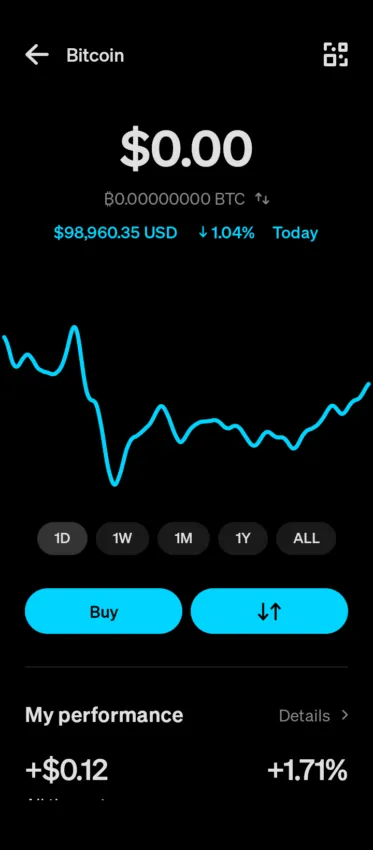
3. Select Send or Receive: After your purchase, select the Send or Receive button with two arrows at the far right. You can send Bitcoin on Cash App via the Lightning Network or standard Bitcoin transfers. Select an address, and Next, to complete your BTC transfer to another wallet.
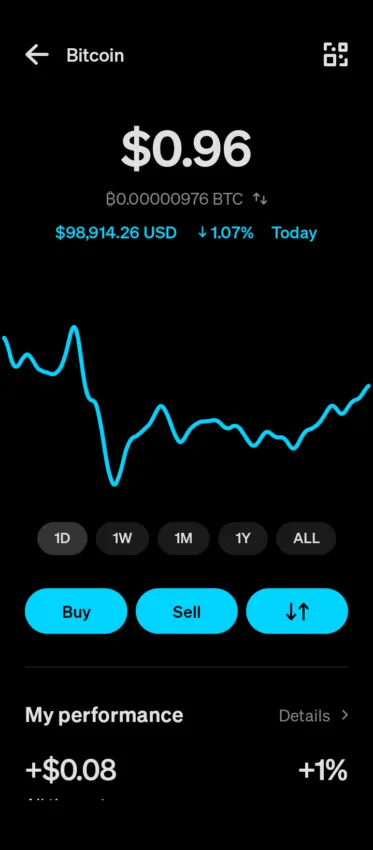
What is Cash App?
Created in 2013 by the late Bob Lee, Cash App is a leading mobile payment app. It enables users to send and receive money electronically through smartphones or other digital devices.
This popular mobile app facilitates peer-to-peer (P2P) transactions, as well as payments to businesses and online purchases. Users link their bank accounts, credit cards, or debit cards to these types of apps to transfer funds quickly and conveniently.
According to data published by Business of Apps, most Cash App revenues come from Bitcoin, which can be acquired on the platform. In 2023, the revenue derived from Bitcoin totaled $14.3 billion.
Things to consider when buying Bitcoin on Cash App
As with any broker, it is important to consider every aspect of its features and policies to get the best out of its services. Here are a few things to consider when you use Cash App to purchase Bitcoin.
Cryptocurrency fees and limits
Cash App may charge you a fee when you purchase or sell Bitcoin. If so, before you finalize the transaction, the fee appears on the trade confirmation.
Note that Cash App does not clarify how it determines its fees or how much it charges for purchasing Bitcoin. However, the fees are typically around 3% for lower dollar purchases and decrease the more Bitcoin you buy.
Additionally, there are no commission fees when using a Cash App brokerage account to invest. Cash App does not charge any fees to open, maintain, or transfer money to an account. That being said, Cash App does incur regulatory fees that it passes on to the customers. By law, FINRA must pay regulatory fees to the Securities and Exchange Commission (SEC).
To generate the necessary funds, FINRA charges its members a fee. These members pass the fee on to their customers, including Cash App.
Security and safety measures
When you purchase Bitcoin on Cash App, it is stored in a combination of cold and hot storage. While the majority of your coins are kept in cold storage, some are kept in hot wallets for day-to-day operations.
Cash App complies with the PCI Data Security Standard (PCI-DSS) Level 1. Whether you’re using public or private Wi-Fi or a data service like 3G, 4G, or EDGE, your payment information is encrypted and securely transmitted to their servers. Your crypto is not lent or leveraged by Cash App. Furthermore, regular audits are carried out to keep the platform’s integrity.
Cryptocurrency price volatility
Whenever you decide to purchase BTC on Cash App, you should always consider Bitcoin’s price volatility. This applies whether you are buying on Cash App or any other platform, broker, or exchange. Price volatility is a prominent characteristic of the cryptocurrency market.
It stems from a variety of factors, including the relatively young and speculative nature of the market, lack of widespread adoption, regulatory uncertainties, and the influence of market sentiment.
Price volatility can present significant opportunities for profit. However, it’s important to note that it also carries increased risks for investors due to the potential for sudden price drops.
You should also remember that every on-chain crypto transaction is subject to a network fee, also known as a miner or gas fee. This fee depends on the crypto that you are transferring. Therefore, it varies from blockchain to blockchain.
Pros of using Cash App to buy BTC
Cash App has many benefits, depending on the use case. However, there are also some drawbacks to using a non-bank financial institution like Cash App. Here is what you need to know.
| Pros | Cons |
|---|---|
| Quick and easy sign-up process | Lacks advanced order types |
| Uses the Lightning Network | High transaction fees |
| Supports crypto and stocks | Only available in the U.S. |
| Cash App card |
Buying Bitcoin with Cash App is quick and easy
As we see more third-party payment platforms integrate Bitcoin into their products, it further proves that crypto is on the verge of mainstream adoption. The more people that buy Bitcoin with Cash App, the more Bitcoin is certified as a viable store of value and medium of exchange. While the fee structure could be more transparent, Cash App offers a seamless way for customers to accumulate BTC.
This article is not financial advice, it is for informational purposes only. Investing is inherently risky and you can lose money. Please invest wisely.
Frequently asked questions
Can I buy cryptocurrency through Cash App?
How do I buy Bitcoins with Cash App?
How do I buy and send crypto with Cash App?
How do I use Cash App to pay in Bitcoin?
How much Bitcoin can I buy on Cash App?
Disclaimer
In line with the Trust Project guidelines, the educational content on this website is offered in good faith and for general information purposes only. BeInCrypto prioritizes providing high-quality information, taking the time to research and create informative content for readers. While partners may reward the company with commissions for placements in articles, these commissions do not influence the unbiased, honest, and helpful content creation process. Any action taken by the reader based on this information is strictly at their own risk. Please note that our Terms and Conditions, Privacy Policy, and Disclaimers have been updated.

